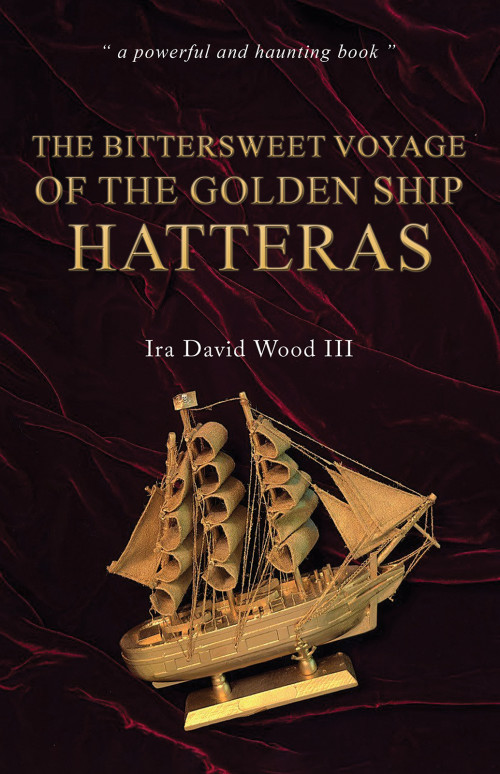
The Bittersweet Voyage of the Golden Ship Hatteras
Book Format: Choose an option
Free standard delivery on UK orders over £35
*Available directly from our distributors, click the Available On tab below

Book Format: Choose an option
Free standard delivery on UK orders over £35
*Available directly from our distributors, click the Available On tab below

Ira David Wood III is an award-winning actor, director, and playwright. He is the founder and current Executive Director of Theatre in the Park, located in Raleigh, North Carolina. He is the proud father of three children: Ira David Wood IV, Evan Rachel Wood, and Thomas Miller Wood. He and his wife, Ashley, remain proud to call North Carolina “home”.
The Bittersweet Voyage of the Golden Ship Hatteras” is a love story, although the story that Ira David Wood III weaves is far more than a tale of romance and passion between young lovers. The book's heart is about the love that grows, blossoms and comes to fruition between the two main characters, Adrian and Michele. But ultimately, it’s Wood’s song of praise, a love song, to the Outer Banks. “I wanted it to be a love story as much about the place as the people,” he told the Voice. Wood, who spent four years acting in The Lost Colony in the 1970s and came back in 2013 to direct the play until COVID closed the play for a season, wanted to “try to capture what life was like during those times, the early 1900s,” he said. Taking place at the turn of the 20th century in Avon, the book paints a picture of a life dominated by the sea and the changing seasons. It is historical fiction, but drawing on memories of talking to Cora Mae Basnight, the mother of the late Senator Marc Basnight and an icon of Manteo society for years, as well as his own research, the book has wonderful touches that bring the period to life. Adrian and his best friend Ned listen to tales of storms past from Skip, the old man they visit in town, and recall the San Ciriaco Hurricane—a system that pummeled the Outer Banks with 120-mile-per-hour winds in 1899. During an ocean rescue, Wood accurately describes how a Lyle gun would have been used to fire a rescue line to a ship in distress and what its limitations would have been. Those touches give the book the sense of time and place that the author was hoping to create. Stylistically, the book is lyrical and filled with images that capture moments in time as though they were pictures. There is a passage in the book where Adrian, Michele and Ned are sailing home after enjoying a picnic lunch at Hatteras Lighthouse. “Adrian is piloting the skiff, Michele is sitting amidship, and Ned, relaxing with his back against the bow, has just picked up his fiddle, carefully wrapped in a small blanket and tucked away in a cabinet under one of the plank seats. The lilting tune of ‘The Red River Valley’ soon joins the music of the crickets and tree frogs. As he deftly draws his bow back and forth over the fiddle’s strings, Need I softly singing.” Asked about the passage, Wood cites his background in performing arts. “I guess maybe I wrote cinematically because I could see the scene just like it was a movie,” he said. The passage also illustrates an important point about the characters and one that is historically accurate. Although the Outer Banks and especially Hatteras Island were quite isolated in the early 1900s, the people living there were often as capable and aware of the world around them as anyone. Ned is a self-taught fiddle player and clearly quite good. Adrian, we learn early in the book, is widely read, identifying his favourite author as Charles Dickens. In a passage that is a send-up of journalists who go into an interview with preconceived notions, Adrian, after a heroic rescue of a crew stranded on a sandbar, is asked by a reporter if it bothers him that he has never travelled the world. He responds that he had been to London just the other day and then quotes extensively from Dickens “A Christmas Carol” describing “pears and apples clustered high in blooming pyramids.” As interesting as the book is, and it is a very pleasant read, the story of how it came to be written is a tale all its own. As told in his Afterward to the book, after his four years performing with “The Lost Colony,” Wood returned to Raleigh, where he was living, and began writing the story based on a tale he had been told by Cap’, an elderly Manteo resident who sold fresh produce from the back of a mule-drawn wagon. As he got busier with life, Wood set the manuscript aside and lost track of it until COVID when he got a call from his sister. “She said, ‘I don’t believe this, but I found your manuscript of that bittersweet voyage up in the attic,’” he recalls. His sister pointed out to him that with COVID happening, there wasn’t much happening in live theatre, so, “Why don’t you get that passion back and try to finish it The finished story was much longer than the original manuscript, with more characters and an eye toward the history of Outer Banks. Wood hoped it was more than a story about lovers, life, and a time and place. “I wanted to try to capture even a part of our history of the Outer Banks that I didn’t live through…to remind people of what it was and the spirit of which I think still exists,” he said. “The Bittersweet Voyage of the Golden Ship Hatteras” by Ira David Wood III is available where books are sold, including at Downtown Books in Manteo and Duck’s Cottage in Duck.
We use cookies on this site to enhance your user experience and for marketing purposes.
By clicking any link on this page you are giving your consent for us to set cookies